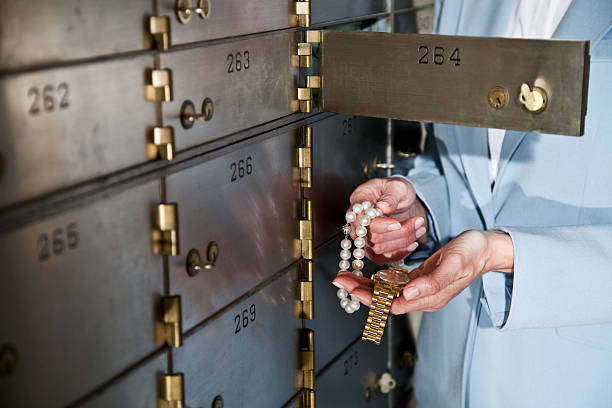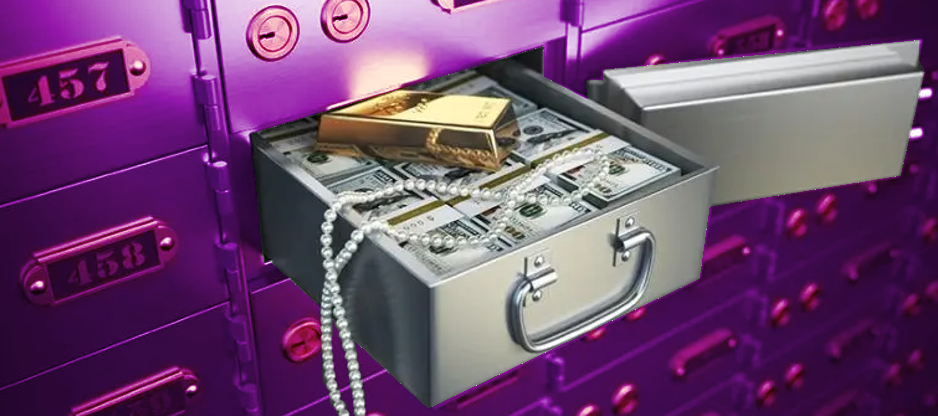When it comes to the security and protection of your valuable items, a safety deposit box is an excellent option. However, there are important considerations and preparations you should make for a safety deposit box appraisal. In this blog post, we will discuss how to prepare for a safety deposit box appraisal, the requirements for accessing a safety deposit box, items that should not be stored in a safe-deposit box, and the government’s ability to access your box. We will also address whether a bank can deny you access to your safety deposit box.
1. How to Prepare for Safety Deposit Box Appraisal:
Before your safety deposit box appraisal, it’s essential to gather all relevant documents and records related to the items you have stored. This includes purchase receipts, certificates of authenticity, and any appraisals you may have obtained in the past. Organize these documents to provide a comprehensive overview of the value and history of your stored items.
2. Hiding Cash in a Safety Deposit Box:
While a safety deposit box can provide secure storage, it is generally not advisable to hide cash in it. Banks are required to report cash transactions above a certain threshold to regulatory authorities. It is best to keep cash in a bank account, where it can be easily accessed and accounted for.
3. Requirements for Safety Deposit Box Access:
To access a safety deposit box, you typically need to be the account holder or an authorized representative. Banks may require proper identification, such as a valid ID or passport, to verify your identity. Additionally, some banks may have specific requirements regarding the account holder’s age or legal capacity.
4. Who Can Access a Safe Deposit Box:
Generally, only the account holder or authorized signatories can access a safe deposit box. However, it is crucial to review the terms and conditions set forth by your bank, as they may have specific policies regarding access and authorization. It is advisable to consult with your bank to understand their specific procedures and requirements.
5. Can the Government Access Your Safety Deposit Box:
Under certain circumstances, such as a court order or investigation related to criminal activity, the government may be able to access your safety deposit box. However, this typically requires proper legal procedures and authorization. It is important to note that privacy laws and regulations vary by jurisdiction, so it’s best to consult with legal professionals for specific guidance.
6. Items That Should Not Be Stored in a Safe-Deposit Box:
While a safe-deposit box is a secure storage option, certain items should not be stored in it. This includes perishable items, firearms, explosives, illegal substances, and items that may pose a danger to others. It is crucial to familiarize yourself with your bank’s guidelines on prohibited items to ensure compliance.
7. Can a Bank Deny Access to Your Safety Deposit Box:
In rare cases, a bank may deny access to a safety deposit box. This can occur if there are legal or regulatory issues involved, such as a court order, outstanding debts, or suspicion of illegal activities. However, banks typically follow strict protocols and legal requirements when denying access to a safety deposit box.
A safety deposit box provides a secure storage solution for your valuable items. To prepare for a safety deposit box appraisal, gather all necessary documents and records. Avoid hiding cash in a safety deposit box and be aware of the specific requirements set by your bank for access. While privacy is generally respected, the government may have the ability to access your box under certain circumstances. It is important to follow your bank’s guidelines on prohibited items and understand that access to your safety deposit box may be denied in exceptional circumstances. By being informed and prepared, you can ensure the safety and proper appraisal of your valuable items stored in a safety deposit box.
Safe Deposit Boxes: Most Frequently Asked Questions:
Do banks check what you put in a safe deposit box?
Banks typically do not check the contents of a safety deposit box. The bank’s role is to provide a secure storage space, and they usually do not inquire about the specific items being stored. However, it is important to note that there are exceptions to this rule, which we will discuss further.
Can the IRS check safe deposit boxes?
The IRS has the authority to seize the contents of a safety deposit box if there is a valid reason, such as suspected tax evasion or illegal activities. However, the IRS cannot access your safety deposit box without proper legal procedures, such as obtaining a court order.
What not to put in a safe deposit box:
Certain items should not be stored in a safe deposit box, including cash, illegal substances, firearms, explosives, and perishable items. It is always advisable to check with your bank regarding their specific guidelines on prohibited items.
Can I hide cash in a safety deposit box?
While safety deposit boxes provide a secure storage option, it is not recommended to hide cash in them. Banks are required to report cash transactions over a certain threshold to regulatory authorities, and it is best to keep cash in a bank account.
How much money can you put in a safety deposit box?
There is generally no limit on the amount of money you can store in a safety deposit box. However, it is important to consider alternative options for large sums of money, such as investment accounts or high-security vaults, depending on your specific needs and concerns.
Are safe deposit boxes traceable in a divorce?
Safety deposit boxes can be subject to legal scrutiny during a divorce proceeding. If there is suspicion of hidden assets, a court may order the investigation and potential seizure of the contents of a safety deposit box.
Can a safe deposit box be traced?
Safety deposit boxes are typically private and confidential. However, in certain legal situations, such as criminal investigations or court orders, the contents of a safety deposit box can be traced and accessed by authorized individuals.
Can a bank open your safe deposit box without you?
Banks generally cannot open a safety deposit box without the presence of the account holder or a legal representative. However, there are exceptional circumstances where a court order or legal authority may grant access to the box without the account holder’s presence.
Who owns the content of a safe deposit box?
The account holder is the legal owner of the contents of a safety deposit box. The bank merely provides the storage space and does not have ownership rights over the stored items.
Can my spouse access my safe deposit box?
In most cases, if you are the sole account holder of a safety deposit box, your spouse will not have automatic access to the box. However, laws regarding spousal access may vary depending on the jurisdiction and specific circumstances. It is advisable to consult with legal professionals to understand your rights and obligations.
What happens to safe deposit boxes when banks collapse?
In the event of a bank collapse, the fate of safety deposit boxes can vary depending on the circumstances. In most cases, the bank’s liquidators or regulators will take control of the assets and work towards returning them to rightful owners. However, it is essential to stay informed and follow instructions provided by the relevant authorities during such situations.

Traditional insurance requires you to provide a list and description of your property, in addition to an appraisal, just to receive a quote on the cost to insure your valuables. PGS Certified Appraisal Service evaluates the contents of on-site bank safe deposit boxes and certified appraisals for valuables in your home or family’s estate. PGS Certified Appraisal Service makes the process fast & easy. Whether you are starting to save for your future or need assistance settling the estate of a loved one, PGS Certified Appraisers can help.
In addition to Safe Deposit Box Appraisals, PGS Gold & Coin provides certified appraisals for the purposes of Bankruptcy, Divorce, and Inheritance. Our professional & knowledgeable appraisers have over 30 years of experience providing trustworthy appraisal services.
BENEFIT FROM OUR SIMPLE & FAST APPRAISAL PROCESS TO HELP BUILD YOUR OWN PORTFOLIO OR TO SETTLE THE ESTATE OF A LOVED ONE.
PGS Gold & Coin Appraisal Service provides appraisals for:
ALL LEGAL PROPERTY THAT FITS INSIDE YOUR BOX OR VAULT, INCLUDING :
- Gold
- Currency
- Bonds
- Collectibles
- Art
- Coins
- Stamps
- Antiques
- Jewelry
- Diamonds & Gems
- Photos
- Digital Backups
What items can I include in my safe deposit box?
- Bond certificates
- Deed
- Car titles
- Passports
- Personal and business contracts
- Documents
- Jewelry or rare collectibles
- Power of attorney
- Important Records
- Marriage certificate
- Mortgage documents
- Valuables
- An inventory of your belongings
- Last Will
- School transcripts
- Treasured Memories
- Adoption papers
- Cash
- Maraige certificate
- Divorce certificate
- Heirlooms
- Home inventory
- Personal papers
- Stamp or coin collections

PGS Gold & Coin, Palatine, IL
830 W. Northwest Highway Suite 7
Palatine, IL 60067
(847) 348-6447
Mon-Fri 10am-6pm
Sat 10am-3pm
Sun Closed

PGS Gold & Coin, Wheaton, IL
600 South County Farm Road
Wheaton, IL 60187
(630) 868-3412
Mon-Fri 10am-6pm
Sat 10am-3pm
Sun closed

PGS Gold & Coin, Schaumburg, IL
900 S Roselle Rd
Schaumburg, IL 60193
(847) 278-7691
Mon-Fri 10am-6pm
Sat 10am-3pm
Sun closed

PGS Gold & Coin, Villa Park, IL
231 W North Ave
Villa Park, IL 60181
(331) 209-9854
Mon-Fri 10am-6pm
Sat 10am-3pm,
Sun closed
Looking to earn some extra cash?
Looking to upgrade your style with something new? Cash in your unwanted gold, silver & platinum jewelry for a fair appraisal at PGS Gold & Coin.
At PGS Gold & Coin, we have built a reputation as the most trusted jewelry buyer in the Chicago area because we routinely offer better appraisals than other jewelry buyers. Bring in your scrap gold, silver, or platinum! Whether it’s old jewelry you don’t wear anymore or mismatched earrings, and our professionals will weigh and evaluate it on the spot. Walk away with cash in hand for your items. Visit our PGS Gold & Coin stores in Wheaton, Palatine, or Schaumburg, IL, and get the most value for your gold today!

PGS APPRAISES & BUYS:
Coins, Bullion, Platinum, Gold, Sterling Silver, Palladium, US & Foreign. Coins & Currency, Diamonds & Jewelry.
JOIN THE PGS COMMUNITY
FOR NEWS & DISCUSSION TOPICS FROM THE COLLECTIBLES WORLD
Looking to earn some extra cash?
Looking to upgrade your style with something new? Cash in your unwanted gold, silver & platinum jewelry for a fair appraisal at PGS Gold & Coin.
At PGS Gold & Coin, we have built a reputation as the most trusted jewelry buyer in the Chicago area because we routinely offer better appraisals than other jewelry buyers. Bring in your scrap gold, silver, or platinum! Whether it’s old jewelry you don’t wear anymore or mismatched earrings, and our professionals will weigh and evaluate it on the spot. Walk away with cash in hand for your items. Visit our PGS Gold & Coin stores in Wheaton, Palatine, or Schaumburg, IL, and get the most value for your gold today!

PGS APPRAISES & BUYS:
Coins, Bullion, Platinum, Gold, Sterling Silver, Palladium, US & Foreign. Coins & Currency, Diamonds & Jewelry.
JOIN THE PGS COMMUNITY
FOR NEWS & DISCUSSION TOPICS FROM THE COLLECTIBLES WORLD


